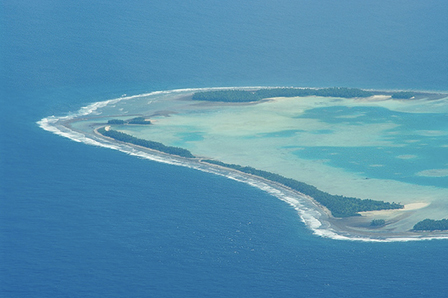Erstellt am: 11. 12. 2015 - 14:27 Uhr
"Countries here are fighting for their existence"
Saturday Reality Check (12 - 13)
Nations United on Climate Change?
The COP21 United Nations conference on climate change in Paris is seen by many as a last chance for coming up with a binding global plan of action. Will Paris succeed where Copenhagen failed? Chris Cummins will be reporting live from Paris on deadline day with a Saturday Reality Check Special.
We are going into extra time at the conference here in Le Bourget. A planet saving agreement was meant to be signed and sealed by this evening, but now the conference president Laurent Fabius has conceded that will probably be no agreement until tomorrow "at the earliest".
It is a reflection of the fact that many sticking points must be overcome before a global agreement can be endorsed by all of the 190 countries at the conference.
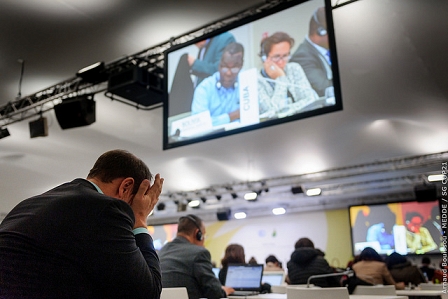
COP21
This means for me, another night of watching and waiting - but it also which gives me a little breather to give you this: my FM4 briefing on what to watch out for at what has been dubbed “the meeting to save the planet”
Dieses Element ist nicht mehr verfügbar
What is the atmosphere at the conference?
The best way I can find to describe it: It is like exam time - but with the future of the planet at stake. A lot of people are nervous - a lot of people, not just the delegates but the NGOs I have spoken to look visibly tired - proper red eyed tired.
Dieses Element ist nicht mehr verfügbar
But also like at exams you tell yourself, 'I have worked hard on this, I did the homework. I know how to makes this work'.
Miguel Arias Canete, the lead negotiator from the EU said: “We have been working on this for four years, we cannot fail. This is crunch time”
There is a feeling that the negotiators have done the ground work and know what positions their opposite numbers hold and where the red-lines are. French President Francois Hollande basically went on a world climate tour this year, listening to the concerns of different regions of the world: maybe this will help lead negotiators to push the right buttons.
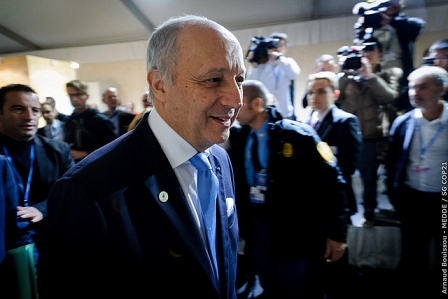
COP21
Laurent Fabius, who is also the French foreign minister, has been praised for bringing a feeling of purpose and stressing compromise. He has even been applauded at the plenary sessions by delegates, which is pretty rare at this sort of meeting
But, as you can tell by the fact that there is another day scheduled, there are many sticking points to get past.
What are these sticking points?
The hours I have spent pouring over draft agreements have felt frankly like the time I have spent pouring over the rental contract agreements you get with a new apartment. You know that each clause is vitally important - the Guardian has famously called this battle to tackle global warming “The Biggest Story in the World”, but it is a dry legal text.
You won’t find a colorful description of the ravages of rising seas, coastal erosion and extreme weather, or enthusiastic descriptions about the potential for clean energy.
Instead you find complicated technical words like “differentiation” and terms like “facilitative dialogue between Parties.”
As Neema Raman, of Friends of the Earth, told me: “this should be a binding agreement, we are not having a coffee shop chat."
Certainly, governments still disagree over the monitoring of emission cuts – the USA in particular wants everyone locked into the same system of checks and balances. The developing world, in general, wants more leadership of carbon cuts on the historic emitters from the west.
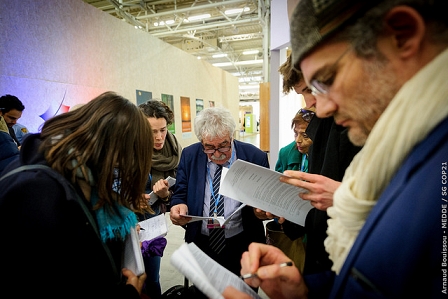
COP21
The small island nations want the target of a maximum temperature rise of 1.5 degrees emphasized more clearly in the text.
This issue, above all others, for me highlights the disparity of climate impact and the differences in urgency of the negotiating delegations:
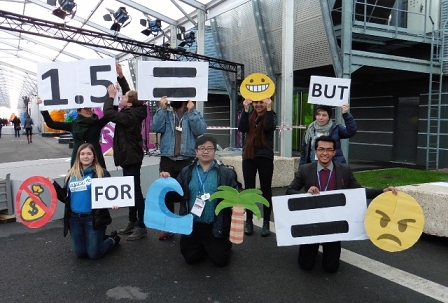
Chris Cummins
a) Legally-binding?
Many governments of developed nations quibble over what sort of cuts their voters will stomach, or which parts of the potential agreements their political systems will accept as legally binding - with US Senators already wagging their fingers.
b) Climate Justice
Many developing nations are talking about “climate justice” - isn’t it only right they have their chance to boost their journey out of poverty with a period of carbon pollution? And if not can the West pay for their transition - and not with loans that saddle with debt but with proper financing to reflect the historic responsibility for the mess we are in.
c) Life or Death
But for small island nations, any failure year to find a workable path to keep global limits to 1.5 degrees Celsius would be akin to signing their death warrant. I have just been speaking to author Naomi Klein, a global superstar of the climate action movement:
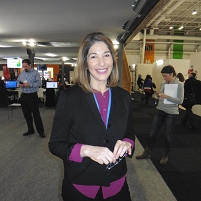
Chris Cummins
“Countries here are fighting for their survival; they are fighting for their very existence. Some stuff in the agreement just sounds bureaucratic; such as the decision whether to aim cap global temperature rises at 2 or 1.5 degrees Celsius. But for a country like the Marshall Islands that is the difference between surviving or not surviving."
At the moment it is vaguely referred to as the eventual goal - but like I might say my eventual goal is to win the Wimbledon Tennis Championships, there is no clear roadmap of how the agreement will force nations to get there. It is all a bit vague. And you can double-fault on the way.
What happens if it is all goes wrong and the conference “fails"?
Activists are more worried about a bad agreement than no agreement. There is a feeling that is desperation to make sure politicians don’t leave Le Bourget with nothing.
Instead they might water down the agreement so much that is basically no longer fit for purpose: that purpose being saving the viability of human civilisation for future generations.
On my way through security today I met Faiza Oulahsen, the Greenpeace activist who was infamously locked up by Russia for protesting against Arctic drilling: She complained that the draft agreement is a vague communal wish list rather than a concrete plan of action – a roadmap to change including the concept of decarbonisation; a route to a fossil-fuel free world by 2050:
Dieses Element ist nicht mehr verfügbar
“There is no point setting yourself a target of 1.5 degrees or even 2 degrees if you don’t have a plan of how to get there.”
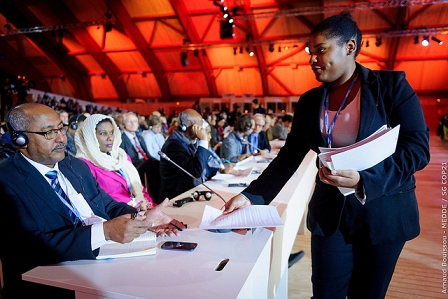
COP21
She says the pledges currently on the table won’t even get us anywhere near the less ambitious goal. I’ve heard politicians, including Barack Obama, say the current pledges add up to a global temperature rise of 2.7 degrees – a rise Obama said is “not good enough.” Naomi Klein is more pessimistic. She told FM4:
“All the intended emission reductions add up to a three or even four degree temperature rise which is, in the words of Kevin Anderson, a renowned emissions reduction expert from the Tyndall Centre, ‘incompatible with anything you can describe as organised society’.”
The stakes are incredibly high.



